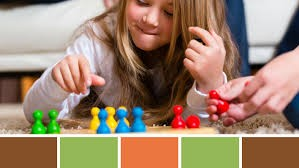Activities for Sustained Attention in 4 to 7-year-old kids
- Dr. V.S. Gayathri
- Mar 24, 2021
- 3 min read
Often parents complain about the inattentiveness of their kids. Many of us keep telling them that that shy be more attentive and focussed, especially when it comes to their studies. Often, we tend to attribute inattentiveness to ADHD (Attention deficit hyperactivity disorder). However, it might not be always true.
It is true that focus and concentration are directly linked to performance, but at times we have to understand the underlying reasons for the lack of attention in a child before jumping to any conclusion.

The lack of attention in children is not always a result of ADHD. It may simply be due to tiredness, or a medical condition. It is important for parents to consider the various causes of inattention in their children in order to determine the best solution. As mentioned in our earlier article, attention can be classified into different types, one of them being sustained attention. Nurturing sustained attention in kids is important as this will help them to focus and increase their performance levels as well.
What is sustained attention?
It is the ability to attend to a stimulus or activity over a long period of time. It is what makes it possible to concentrate on an activity for as long as it takes to finish, even if there are other distractions present. In real life, it is the need or ability to ignore a variety of distractions and inhibit attention shifts to irrelevant activities.
The average attention span in a 4 to 7 years old is around 8 to 18 minutes. According to child development experts, on average, a 4- or 5-year-old child should be able to focus on a task for 2 to 5 minutes times the year of their age. But again we want to reinforce the fact that attention depends on the situation as well.

Here are some tips and techniques on developing sustained attention for kids in the age group of 4 to 7 years.
1) Memory game- This classical method is one of the best ways to start developing attention and an eye for detail. You can play verbally some memory game like remembering names of vegetables or animals one by one, altogether. Or you can use your child’s toys for this and you can add a little variation too.
Variation 1
You can lay out the toys and then ask them to see. Then, you can ask them to go somewhere else and then remove a toy from the space. Once they come back, they have to identify which toy is missing.
Variation 2
In the above setup, instead of removing a toy, you can change the position and ask your child to identify which one has been moved.
2) Circle the letter: You can give them a group of letters and ask them to find a particular letter in that. You can give them a different image or assortment of letters every time. You can also use sketches, crayons, pens for this activity.
3) Crossword puzzle: This is one more way to nurture attention for this age group. You can look online for simple crossword puzzles for them. To make it more fun and interesting for younger kids, you can create a crossword with their friend’s names or their favorite toys. This will also them you to check how vigilant they are.
4) Activity with old newspapers/magazines: You can take any old newspaper or books and ask them to circle out specific letters. Or specific words you say. For example, it, the, and- these words are often used and they can find it anywhere. This will help them to focus and also develop an eye for detail.

The most important thing about all these activities is that they are fun and educative at the same time. So, remember scolding or nagging won’t help much. Rather, involve yourself with your child during these formative years and help them in areas where you feel they are lacking. Always remember not to say ‘You have made wrong’ to kids, rather teach them self-correction.
Once you help them nurture focus and concentration during their early years, you prepare them for life.




Comments